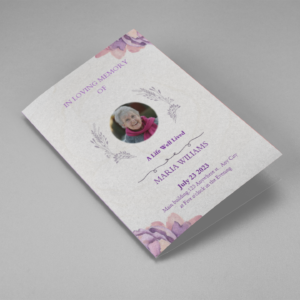Memorial programs are a vital part of any funeral or remembrance service. They serve not only as a guide for the proceedings but also as a cherished keepsake for family and friends. A well-crafted memorial program can capture the essence of a person’s life, preserve memories, and offer comfort to those in attendance. This guide will explore how to create meaningful memorial programs that truly honor your loved one.
Introduction: Why Memorial Programs Matter
Memorial programs provide more than just a schedule of events for a funeral or memorial service. They encapsulate the life, legacy, and spirit of the deceased in a tangible form. These programs often include a collection of meaningful elements such as photos, poems, readings, and personal reflections that reflect the personality and impact of the person being remembered.
Creating a meaningful memorial program can be a healing and therapeutic process for family members and friends, offering a chance to commemorate a life lived fully. Additionally, attendees often keep these programs as a memento, allowing them to revisit memories and reflect on the shared experience of the service.
Elements of a Meaningful Memorial Program
When designing a memorial program, several elements can help make it more meaningful and personal. These elements reflect the uniqueness of the deceased and provide comfort and connection to those attending the service.
1. Cover Page
The cover of the program sets the tone for the entire service. It usually includes:
- The full name of the deceased.
- Dates of birth and death.
- A photo of the individual.
- The title of the service, such as “Celebration of Life” or “In Loving Memory.”
Consider choosing a photo that reflects your loved one’s personality—whether it’s a formal portrait or a candid snapshot. The title can also be customized to reflect the tone of the service, whether it’s solemn or celebratory.
2. Order of Service
The order of service outlines the events of the ceremony. It can include:
- Processional music.
- Readings and scripture passages.
- Eulogies or tributes.
- Special performances or musical selections.
- Closing remarks and recessional music.
Having a clear order of service helps attendees follow along and participate in the ceremony. Including meaningful music or personal readings can further personalize the experience.
3. Obituary or Life Story
Including an obituary or brief biography is a powerful way to summarize the life of the person being remembered. It typically highlights significant milestones, achievements, and relationships, as well as the qualities that made the person special.
The life story can be written by a family member or close friend and should convey the character, passions, and lasting impact of the deceased.
4. Photos and Images
Photos are a beautiful way to capture memories and create a personal connection with attendees. Consider including a range of images:
- Childhood photos.
- Pictures of family gatherings or special events.
- Professional or hobby-related images.
You can also consider creating a photo collage or selecting a background image that adds a visual layer of meaning, such as a favorite landscape or meaningful symbol.
5. Poems, Quotes, or Scripture
Incorporating poetry, meaningful quotes, or scripture passages can provide comfort and inspiration. Consider selecting text that resonates with the life of your loved one or reflects their values and beliefs.
Popular options include:
- Religious texts.
- Inspirational poetry.
- Song lyrics.
- Famous quotes or personal sayings.
6. Thank You Message
Including a section that thanks attendees for their support during this difficult time is a thoughtful touch. You can also acknowledge specific individuals or groups who provided assistance or made contributions.
This message might include a note of gratitude for the love, prayers, and support that family and friends have offered.
7. Closing Thoughts or Memorial Details
If there are additional details about the memorial service, such as a post-service reception or burial location, these can be included in the program. You may also add personal reflections or words of encouragement to close the program in a comforting way.
How to Create a Meaningful Memorial Program
Now that you understand the elements of a memorial program, let’s go through the steps to create one that is truly meaningful.
1. Gather Personal Information
Start by collecting key information about your loved one’s life, such as their birth and death dates, family members, education, career, and hobbies. Gather photos, memorable quotes, and any special requests for the order of service.
2. Choose the Right Design and Layout
The layout of the memorial program should be clean, organized, and easy to read. Consider different types of layouts, such as:
- Bi-fold programs.
- Tri-fold programs.
- Multi-page booklets.
Each format has its own benefits, depending on how much content you plan to include. Choose a template that complements the tone of the service and allows space for all the essential information.
3. Select Appropriate Colors and Themes
The color scheme and overall theme of the program should reflect the personality and preferences of the deceased. Some families may choose classic black-and-white designs, while others might opt for soft pastels or vibrant colors.
The theme can also be shaped by the deceased’s interests, such as:
- Nature themes.
- Religious or spiritual symbolism.
- Favorite hobbies or sports.
4. Write from the Heart
When writing the obituary, life story, or thank you message, try to speak from the heart. This is your opportunity to convey the love, gratitude, and impact that your loved one had on the world. Authenticity and sincerity will make the program even more meaningful to those who read it.
5. Proofread and Finalize
Before printing, proofread the program for spelling and grammar errors, and make sure all dates, names, and details are accurate. If possible, have another person review it as well to ensure clarity and correctness.
Tips for Personalizing a Memorial Program
Making the memorial program truly personal can help bring comfort to those in attendance and honor the memory of your loved one in a special way. Here are some tips for adding personal touches to the program:
- Use Handwritten Notes: Consider adding a section with handwritten notes or signatures from family members.
- Include a Special Tribute: Include a section where friends or family members share their memories, thoughts, or feelings about the deceased.
- Share a Favorite Recipe: If your loved one was known for a special recipe or dish, sharing it in the program can add a unique and personal element.
- Incorporate Cultural or Religious Traditions: Make sure to include any cultural or religious traditions that were important to the deceased or their family.
Memorial Program Templates
-
Searching for a Oak Leaf With Gold Oval Frame Half Page Funeral Program that is easy to print and amass and has a cutting-edge look? The Oak Leaf With Gold Oval Frame Half Page Funeral Program is the Perfect decision because it measures 8.5”x 5.5”.
- No Limitation on Content, Edit anything
- Edit anytime – unlimited revisions even after purchased
- Get a printable PDF downloaded to get it printed on your own.
-
Searching for a Brown and White Classic Funeral Program Half Page Program that is easy to print and amass and has a cutting-edge look? The Brown and White Classic Funeral Program Half Page Program is the Perfect decision because it measures 8.5”x 5.5”.
- No Limitation on Content, Edit anything
- Edit anytime – unlimited revisions even after purchased
- Get a printable PDF downloaded to get it printed on your own.
-
Searching for a Purple Elegant Watercolor Half Page Funeral Program Template that is easy to print and amass and has a cutting-edge look? The Purple Elegant Watercolor Half Page Funeral Program Template is the Perfect decision because it measures 8.5”x 5.5”.
- No Limitation on Content, Edit anything
- Edit anytime – unlimited revisions even after purchased
- Get a printable PDF downloaded to get it printed on your own.
-
Searching for a Cream and Green Photo Obituary Half Page Program that is easy to print and amass and has a cutting-edge look? The Cream and Green Photo Obituary Half Page Program is the Perfect decision because it measures 8.5”x 5.5”.
- No Limitation on Content, Edit anything
- Edit anytime – unlimited revisions even after purchased
- Get a printable PDF downloaded to get it printed on your own.
-
Searching for a Cream Simple Elegant Photo Church Half Page Program that is easy to print and amass and has a cutting-edge look? The Cream Simple Elegant Photo Church Half Page Program is the Perfect decision because it measures 8.5”x 5.5”.
- No Limitation on Content, Edit anything
- Edit anytime – unlimited revisions even after purchased
- Get a printable PDF downloaded to get it printed on your own.
-
Searching for a Samovar Silver Half Page Funeral Program Template that is easy to print and amass and has a cutting-edge look? The Samovar Silver Half Page Funeral Program Template is the Perfect decision because it measures 8.5”x 5.5”.
- No Limitation on Content, Edit anything
- Edit anytime – unlimited revisions even after purchased
- Get a printable PDF downloaded to get it printed on your own.
-
Searching for an Elegant Beige Half Page Funeral Program Template that is easy to print and amass and has a cutting-edge look? The Elegant Beige Half-Page Funeral Program Template is the Perfect decision because it measures 8.5”x 5.5”.
- No Limitation on Content, Edit anything
- Edit anytime – unlimited revisions even after purchased
- Get a printable PDF downloaded to get it printed on your own.
-
Searching for a White Floral Pro Half Page Funeral Program Template that is easy to print and amass and has a cutting-edge look? White Floral Pro Half Page Funeral Program Template is the Perfect decision because it measures 8.5”x 5.5”.
- No Limitation on Content, Edit anything
- Edit anytime – unlimited revisions even after purchased
- Get a printable PDF downloaded to get it printed on your own.
-
Searching for a Grey and Burgundy Elegant Half Page Funeral Program Template that is easy to print and amass and has a cutting-edge look? Grey and Burgundy Elegant Half Page Funeral Program Template is the Perfect decision because it measures 8.5”x 5.5”.
- No Limitation on Content, Edit anything
- Edit anytime – unlimited revisions even after purchased
- Get a printable PDF downloaded to get it printed on your own.
-
Searching for a Soft Green and Grey Minimalist Floral Half Page Funeral Program Template that is easy to print and amass and has a cutting-edge look? Soft Green and Grey Minimalist Floral Half Page Funeral Program Template is the Perfect decision because it measures 8.5”x 5.5”.
- No Limitation on Content, Edit anything
- Edit anytime – unlimited revisions even after purchased
- Get a printable PDF downloaded to get it printed on your own.
-
Searching for a Gray Elegant Oval Frame Half Page Funeral Program Template that is easy to print and amass and has a cutting-edge look? Gray Elegant Oval Frame Half Page Funeral Program Template is the Perfect decision because it measures 8.5”x 5.5”.
- No Limitation on Content, Edit anything
- Edit anytime – unlimited revisions even after purchased
- Get a printable PDF downloaded to get it printed on your own.
-
Searching for a Blue Organic Minimal Half Page Funeral Program Template that is easy to print and amass and has a cutting-edge look? Blue Organic Minimal Half Page Funeral Program Template is the Perfect decision because it measures 8.5”x 5.5”.
- No Limitation on Content, Edit anything
- Edit anytime – unlimited revisions even after purchased
- Get a printable PDF downloaded to get it printed on your own.
-
Searching for a Pink and Orange Watercolour Half Page Funeral Program Template that is easy to print and amass and has a cutting-edge look? Pink and Orange Watercolour Half Page Funeral Program Template is the Perfect decision because it measures 8.5”x 5.5”.
- No Limitation on Content, Edit anything
- Edit anytime – unlimited revisions even after purchased
- Get a printable PDF downloaded to get it printed on your own.
-
Searching for a Pink Floral Paper Half Page Funeral Program Template that is easy to print and amass and has a cutting-edge look? Pink Floral Paper Half Page Funeral Program Template is the Perfect decision because it measures 8.5”x 5.5”.
- No Limitation on Content, Edit anything
- Edit anytime – unlimited revisions even after purchased
- Get a printable PDF downloaded to get it printed on your own.















